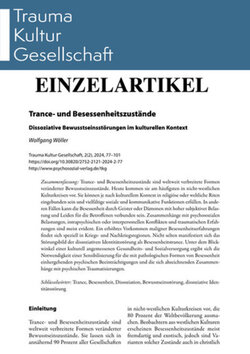25 Seiten, PDF-E-Book
Erschienen: Mai 2024
Bestell-Nr.: 36542
https://doi.org/10.30820/2752-2121-2024-2-77
abonnieren
Wolfgang Wöller
Trance und Besessenheitszustände (PDF)
Dissoziative Bewusstseinsstörungen im kulturellen Kontext
Sofortdownload
Dies ist ein E-Book. Unsere E-Books sind mit einem personalisierten Wasserzeichen versehen,
jedoch frei von weiteren technischen Schutzmaßnahmen (»DRM«).
Erfahren Sie hier mehr zu den Datei-Formaten.
Tranceund Besessenheitszustände sind weltweit verbreitete Formen veränderter Bewusstseinszustände. Heute kommen sie am häufigsten in nicht-westlichen Kulturkreisen vor. Sie können je nach kulturellem Kontext in religiöse oder weltliche Riten eingebunden sein und vielfältige soziale und kommunikative Funktionen erfüllen. In anderen Fällen kann die Besessenheit durch Geister oder Dämonen mit hoher subjektiver Belastung und Leiden für die Betroffenen verbunden sein. Zusammenhänge mit psychosozialen Belastungen, intrapsychischen oder interpersonellen Konflikten und traumatischen Erfahrungen sind meist evident. Ein erhöhtes Vorkommen maligner Besessenheitserfahrungen findet sich speziell in Kriegsund Nachkriegsregionen. Nicht selten manifestiert sich das Störungsbild der dissoziativen Identitätsstörung als Besessenheitstrance. Unter dem Blickwinkel einer kulturell angemessenen Gesundheitsund Sozialversorgung ergibt sich die Notwendigkeit einer Sensibilisierung für die mit pathologischen Formen von Besessenheit einhergehenden psychischen Beeinträchtigungen und die sich abzeichnenden Zusammenhänge mit psychischen Traumatisierungen.
Abstract:
Trance and possession states are forms of altered states of consciousness that are widespread throughout the world. Today, they are most common in non-Western cultures. Depending on the cultural context, they can be integrated into religious or secular rites and fulfill a variety of social and communicative functions. In other cases, possession by spirits or demons can be associated with a high level of subjective stress and suffering for those affected. Connections with psychosocial stress, intrapsychic or interpersonal conflicts and traumatic experiences are usually evident. An increased incidence of malignant possession experiences is found especially in war and post-war regions. The disorder syndrome of dissociative identity disorder often manifests itself as a trance of obsession. From the perspective of culturally appropriate health and social care, there is a need for an awareness of the psychological impairments associated with pathological forms of obsession and the emerging connections with psychological trauma.
Abstract:
Trance and possession states are forms of altered states of consciousness that are widespread throughout the world. Today, they are most common in non-Western cultures. Depending on the cultural context, they can be integrated into religious or secular rites and fulfill a variety of social and communicative functions. In other cases, possession by spirits or demons can be associated with a high level of subjective stress and suffering for those affected. Connections with psychosocial stress, intrapsychic or interpersonal conflicts and traumatic experiences are usually evident. An increased incidence of malignant possession experiences is found especially in war and post-war regions. The disorder syndrome of dissociative identity disorder often manifests itself as a trance of obsession. From the perspective of culturally appropriate health and social care, there is a need for an awareness of the psychological impairments associated with pathological forms of obsession and the emerging connections with psychological trauma.
Wolfgang Wöller, Ursula Gast & Reinhold Görling S. 5–8Editorial (PDF)
DissoziationUrsula GastS. 9–33Und es gibt sie doch … (PDF)
Die dissoziative Identitätsstörung und die aktuelle Kontroverse um die Erkrankung1Wiebke PapeS. 35–51Der sogenannte ›Täterkontakt‹ - ein simplifizierender Begriff für komplexe Bindungen1 (PDF)
Reinhold GörlingS. 53–64Gewalt und Intimität (PDF)
Zu All eure Gesichter (2023) von Jeanne Herry und Das Wolfshaus (2018) von Joaquín Cociña und Cristóbal LeónSilvia BahlS. 65–76Das Shmoo (PDF)
Therapeutisches Feld, Figurabilität und die Ko-Konstruktion psychischer StrukturWolfgang WöllerS. 77–101Trance und Besessenheitszustände (PDF)
Dissoziative Bewusstseinsstörungen im kulturellen Kontext
DissoziationUrsula GastS. 9–33Und es gibt sie doch … (PDF)
Die dissoziative Identitätsstörung und die aktuelle Kontroverse um die Erkrankung1Wiebke PapeS. 35–51Der sogenannte ›Täterkontakt‹ - ein simplifizierender Begriff für komplexe Bindungen1 (PDF)
Reinhold GörlingS. 53–64Gewalt und Intimität (PDF)
Zu All eure Gesichter (2023) von Jeanne Herry und Das Wolfshaus (2018) von Joaquín Cociña und Cristóbal LeónSilvia BahlS. 65–76Das Shmoo (PDF)
Therapeutisches Feld, Figurabilität und die Ko-Konstruktion psychischer StrukturWolfgang WöllerS. 77–101Trance und Besessenheitszustände (PDF)
Dissoziative Bewusstseinsstörungen im kulturellen Kontext

